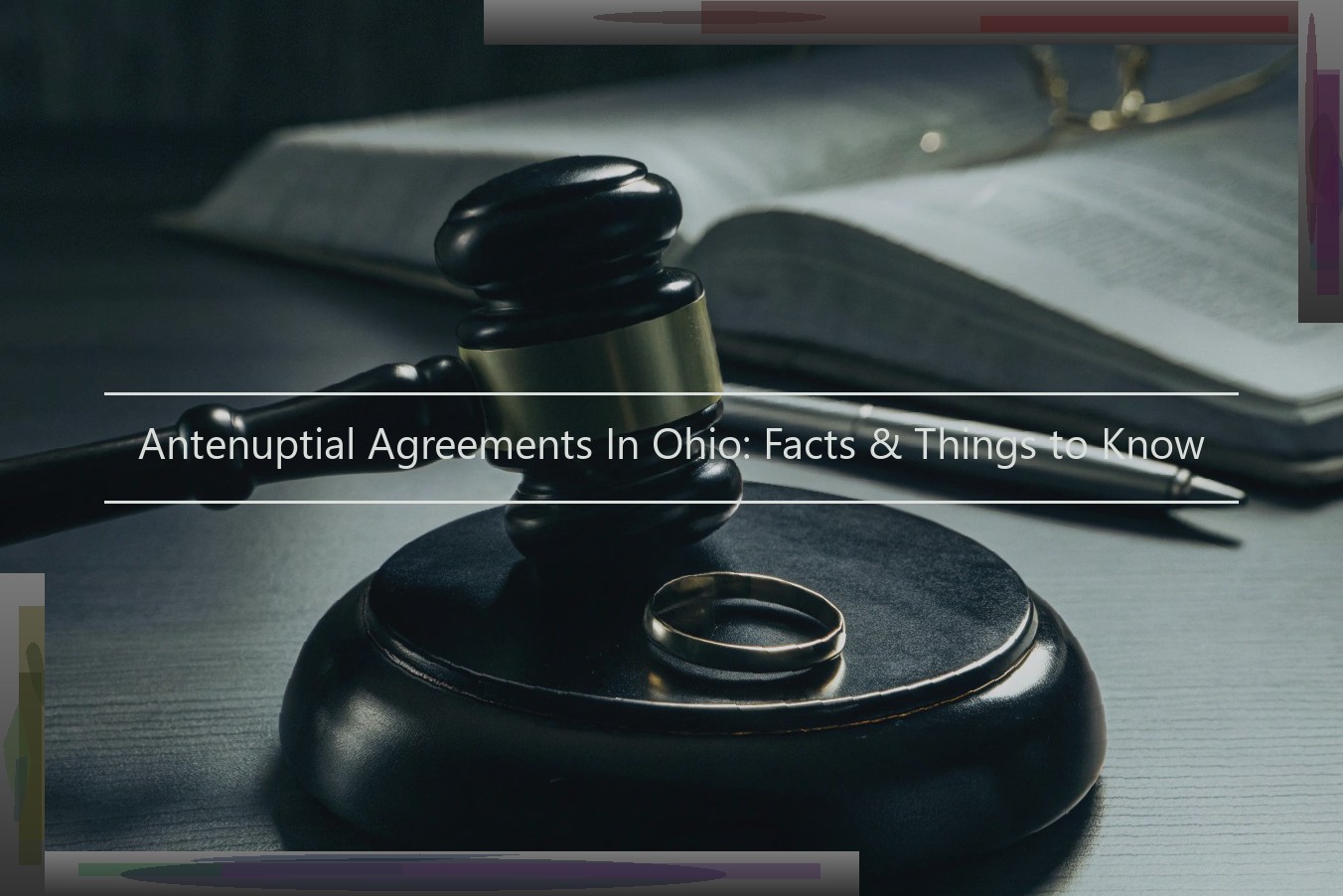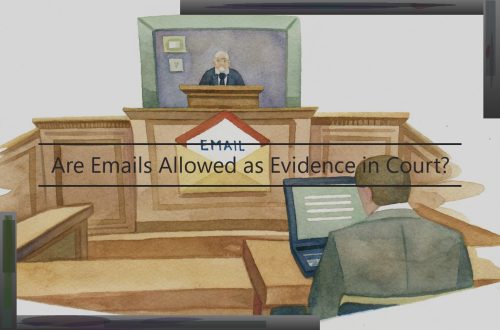Antenuptial Agreements In Ohio: Facts & Things to Know
What is an Antenuptial Agreement?
An antenuptial agreement is a contract between two persons who plan to marry, generally executed just prior to marriage. It may also be referred to as a prenuptial agreement or premarital agreement. The general purpose of antenuptial agreements is to protect one or both parties’ assets in the event of a divorce or death and to clarify the parties’ interests in property during the marriage.
Antenuptial agreements are governed in Ohio by section 3103.06 of the Ohio Revised Code. The statute provides that an antenuptial agreement can deal with the following: An antenuptial agreement must be in writing and signed by both parties. It must generally be signed voluntarily by both parties and neither party can have been under duress , fraud or undue influence when signing. The parties must also normally have reasonably adequate knowledge of each other’s assets and income when executing the agreement. The agreement must also be entered into voluntarily and without undue influence.
Although Ohio law permits review of the agreement by an attorney, there is no requirement that an intervening attorney review the agreement prior to its execution. The failure to follow the statutory requirements could result in invalidation of the agreement by the court.

Requirements for Validity in Ohio
Ohio law does not require that an antenuptial agreement be in writing. Nonetheless, the overwhelming majority of agreements, no matter what the cost, are word documents with digitally generated signatures on the last page. Ohio follows the Uniform Premarital Agreement Act codified in Ohio Revised Code 3103.06 through 3103.10, and addresses the content of the agreement (R.C. 3103.06), the scope of the agreement (R.C. 3103.07), enforcement (3103.08), process of amendment (R.C. 3103.09) and also allows for a waiver of spousal rights under Ohio law (R.C. 3103.10). Ohio caselaw has further helped define and shape this area of law. Reams v. Reams, 50 Ohio App.2d 69 demonstrates that a valid premise premarital agreement must be signed. However, rosy language found in an agreement such as the following may not thwart the enforcement of the contract in Ohio: (1)(a) The husband and wife will agree to the terms and conditions set forth in this Antenuptial Agreement and b) the husband and wife further understand and voluntarily intend for this Antenuptial Agreement to be legally binding. (2) Both the husband and wife represent and warrant to each other that they have fully and fairly disclosed his and her income, assets, property, and financial obligations.
Typical Terms of Ohio Antenuptial Agreements
When entering into an antenuptial agreement, in addition to the requirements that the contract not be unconscionable and that both parties provide a full disclosure of assets and debts, there are several types of agreements which are more commonly found in these contracts:
Asset Division – The parties may agree that in the event of divorce each party retains ownership of all that they had in their possession at the time of marriage as well as any assets that they acquire following the marriage.
Spousal Support – The parties may agree in advance that should they divorce neither will have the right to ask for and/or receive spousal support from the other.
Maintenance of Debts – The parties may share debt responsibility, or they may agree that each will be responsible for pre-existing debts as well as any debts individually acquired during the marriage.
Division of Retirement or Pension Benefits – The parties may agree to not claim any interest in each other’s pension benefits and/or retirement accounts.
Estate Planning – If the parties enter into an antenuptial agreement, they may still need a will or should consider a will as part of their divorce strategy.
Retirement or Death – The Ohio courts have held that if the requirements for an antenuptial agreement are met, the agreement will be upheld even in the case of the death of one of the spouses.
When Are Antenuptial Agreements Enforceable
In determining the enforceability of an antenuptial agreement, Ohio courts will look to whether the agreement is a product of "full and fair disclosure" and whether the agreement is conscionable. The question will also arise as to whether "confidential or fiduciary conditions" existed in the relationship. Put another way, whether the parties were in a legal "special relationship" where a confidential or fiduciary relationship exists.
While Ohio divorces typically involve a division of property that each spouse has acquired during the marriage, not much attention is paid to what property existed before the marriage. The reason behind this is that in Ohio, there is no separation of assets into premarital and marital. Instead, once the husband and wife marry their separate property is automatically converted to marital property.
More specifically, premarital property (premarital income and assets) does not change from separate property to marital property but the income generated by the separate property during the marriage does change to marital property which the Court is allowed to divide at divorce. The exception to the general rule is if an asset appreciated in value due to the efforts of the other party during the course of the marriage which is considered by Ohio Courts to be marital property even though the appreciation occurred to the original separate property.
In determining whether a premarital agreement is enforceable the Courts will look at the following information:
The general rule of full and fair disclosure is that the parties should make a full disclosure of their assets. In other words, if one spouse is not aware of what assets the other spouse possesses the agreement may be unenforceable. Although this does not mean that the parties have to list every single piece of their assets on a piece of paper, given the size of the property, the Court could require every single item be disclosed.
In addressing the conscionability of the agreement, the Court’s concern is whether both parties had full knowledge and understanding of the rights and obligations that were being affected by the terms of the agreement, whether influence was exerted on one spouse by the other spouse to enter the agreement, and whether there is any fraud or overreaching by one party that may have deprived the other party of any benefit of the agreement.
If one spouse hired attorneys and the other spouse was not given this option the Court will decide how important that is to the decision as to whether the agreement is conscionable.
If the Court determines that an unfairness occurred during the execution of the agreement and there was no full and fair disclosure, the Court can choose to enforce the valid clauses of the agreement and invalidate the other clauses. This means that the Court would treat some of the clauses in the agreement as invalid leaving the remainder of the agreement enforceable.
As a general rule, Ohio Courts are not automatically going to invalidate an antenuptial agreement just because both parties did not have attorneys, but the Court will look to see whether an attorney could have been important to the execution of the agreement which would affect the outcome of whether the agreement should be enforced.
Finally, Ohio Courts historically upheld all properly executed prenuptial agreements until 2005 when the Ohio Supreme Court ruled in Schwartz v. Schwartz (2005).
In Schwartz, the Court reached its decision by applying the standard under R.C. 3103.09. In this statute it requires the Court to defer to the importance of the marital rights being waived or forfeited by the parties prior to the marriage. Further, the main issue that the court addressed was whether both parties were given a "full and reasonable opportunity to protect their rights."
The court explained that the issue of whether significant effect or changes in the outcome of the terms of the agreement are due to one of the parties reliance on the agreement or the non-execution of the agreement by the party, the Court stated that the general standard to be applied is whether the party was free to reject the agreement or accept it without affecting the relationship between the spouses. Intelligence, age, experience and education were factors that could be considered by the Court.
The Pros & Cons
The advantages of antenuptial agreements are clear. They provide a unique opportunity for two people, soon to be husband and wife, to avoid the potential pitfalls of the ordinary terms of Ohio law, the 500 page long (and growing) Ohio Revised Code. Antenuptial agreements also provide the opportunity for parties to streamline a potential divorce or dissolution and even stay out of court altogether.
As with anything in life, however, there are some potential drawbacks. While many people think that they are agreeing to an antenuptial agreement lying down, in reality they may not have nearly the negotiating power of the other party to the agreement. Just as in other contract negotiations, an attorney can round up a document, present it, and negotiate it. An attorney can also contact the other party’s attorney and make modifications. There’s also the possibility that at a later date , one party will claim that they did not "read" the agreement, or could not remember what parts were explained, but that they signed it without review to "keep the peace." The better option is to retain an experienced divorce or family law attorney beforehand to review the document and answer any questions that a later date could raise.
Ohio law is also clear about when an antenuptial agreement is enforceable; in general, only if there was voluntary and informed consent. Many times this is more clear and easy to prove than it sounds. If, however, there is any argument as to whether there was voluntary consent, the issue can end up being decided by a jury instead of the judge. Top-tier divorce attorneys know how to protect their client’s interests in either direction, and in doing so, can help set things right from the start.
How to Create an Antenuptial Agreement
To create an antenuptial agreement between the parties, attorney’s first prepare the Agreement for both parties to review. The parties and attorney’s then negotiate the terms of the agreement. It is important that each party is forthright, full and honest with their assets and debt so that the terms the parties agree on during negotiations are an accurate portrayal of the financial circumstances going into the marriage. In Ohio, it is important that the parties have independent legal counsel. This means that each party has their own separate attorney to give them legal advice with regard to the terms of the Agreement. If one attorney prepares the Agreement, many times, the Agreement can be contested at a later date.
Common Myths
A common misconception regarding antenuptial agreements is that they are only used by the wealthy. Certainly assets owned by the parties at the time an antenuptial agreement is drafted and signed or those assets acquired during the marriage could justify whether the agreement is ultimately necessary to protect those assets or not. However, wealth is not the only consideration. Any party may wish to protect a family or asset which may be given to him or her during the marriage from a potential claim by the spouse in the event of a divorce. This could include gifts, an inheritance or even a future business venture whose operation will be financed through an existing asset. Those assets may need protection regardless of their value.
Another common misconception is that once an antenuptial agreement is executed, the parties will have an unfettered right to assets which they did not own before the marriage in the event of a divorce. While this greater protection for all assets may be obtained, will depend upon how the documents are written to protect those items. The relief obtained by the parties through an antenuptial agreement will be set forth in the agreement itself . The law is not going to provide you with greater relief than what the document actually provides. It is important that the attorney representing an individual in this situation, during the preparation of an antenuptial agreement (or before), understands the probate process. Such knowledge will allow the drafter to draft terms of the agreement in such a way as to ensure the provisions will be fully enforceable in the event of death or divorce.
Another misconception is that all antenuptial agreements are the same, one being just as good as another. Antenuptial agreements should always be drawn up by an attorney who practices in the area of Family Law on a regular basis. In addition, it is always important that each party’s attorney drafts the final version of the agreement with particular attention to his or her client’s best interests. Generally retainer agreements and cost structures of attorneys are similar for drawing up custody agreements as they are for an antenuptial agreement. In many cases, the cost of the document will be much less than the amount of money spent on legal fees down the road when the parties find themselves litigating the terms of the agreement in court.




